#us education
Text
Through my public school education in the '90s and early '00s, our US history classes always ran out of time at the end of the year, somewhere around the '60s civil rights movement. We usually had enough time for a rushed, incomplete, confusing explanation of the Vietnam War. We never learned about Watergate or the fall of the Berlin Wall or Reagonomics or the Gulf War. They were in our history books, but we never got to that part.
It terrifies me to wonder what era history classes end on now. Do they make it past the Cold War era now? Past 9/11 and the War on Terror? Or are young folks today entirely uneducated on the horrific Islamophobia and civilian slaughter that occurred at the beginning of this millennium?
2K notes
·
View notes
Photo
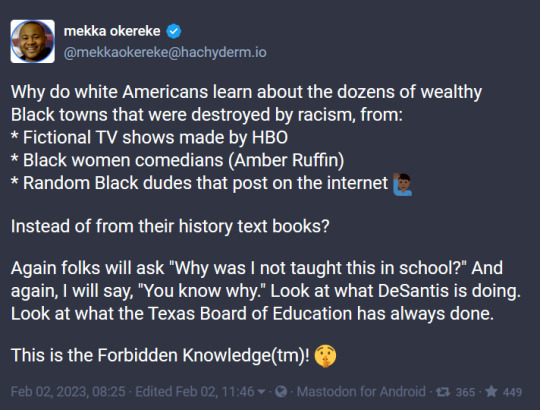
#toot#toots#mastodon#black history month#black history usa#black history#american racism#racism#brown vs the board of education#us education#public education#education#history#Manufacturing Consent#public school#school
1K notes
·
View notes
Text
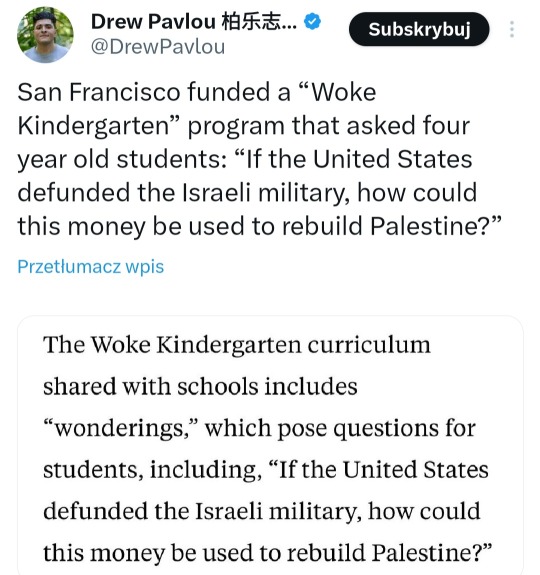
https://x.com/DrewPavlou/status/1753951986175844734
Tax funded indoctrination before you learn to read and count? Can we call it grooming already?
#san francisco#woke#israel#israel hamas war#hamas#gaza#sjw#sjw bullshit#education#us education#us politics#politics#grooming
205 notes
·
View notes
Text
Not to go off, but:
- structural, racial, and financial inequalities make it next to impossible for some parents to parent effectively (because they’re working six jobs and/or are in prison and/or are chronically ill);
- their kids go to understaffed and underfunded schools who are expected to provide not just education but also child care, mentoring, mediation, and twelve other unfunded mandates to support their students;
- the kids wind up trying to parent themselves and counsel their friends in schools that are not following through on their IEPs, not providing effective classroom management, and not able to keep sufficient adults around for supervision — and schools are thence full of dysregulated children. many of them high as balls, who do not feel safe;
- and our health insurance companies give me and my colleagues in community mental health like 8-12 therapy sessions to fix alllll of that and refer them out to community supports that either don’t take public insurance or straight up don’t exist.
(Plus we still don’t agree on best practices for teaching people to safely use television and the internet, much less these damn smartphones, and our brains are still running hardware from 150,000 years before the Neolithic Revolution.)
So not to kvetch or anything? but I think the rich assholes who have been profiteering off of the aforementioned inequalities should be obligated to spend a few billion dollars to fund some smart people who have been trying to actually fix, like, literally any part of this.
I ranted yesterday at the end of this post about C-PTSD about the extensive damage chronic stress and chaos does to brains. We have set up a system in which this damage is almost unavoidable for a vast number of people, and it’s only snowballing out of control as the generational trauma continues to rack up. (This shit was already endemic when I was a kid, and I’m old enough to be some of these kids’ grandparents.)
We continue to ask more out of workers, more out of children, and more out of their schools, and while thank GOD people are finally talking openly about the impact on mental health, community mental health centers designed to patch you up and send you back for more systemic damage are … not gonna be enough.
Like, it’s something! Therapy will and can and does help! But if you are sensing the game is rigged, I am here to validate the shit out of that for you.
And yet. And yet. We go on. Gotta haul on that moral arc and bend it. 💛
#mental health#us education#late stage capitalism#systemic inequality#complex post traumatic stress disorder#children are people#so are parents#aunt sanj says touch grass drink water and take your damn meds
112 notes
·
View notes
Text
America has legislated itself into competing red, blue versions of education
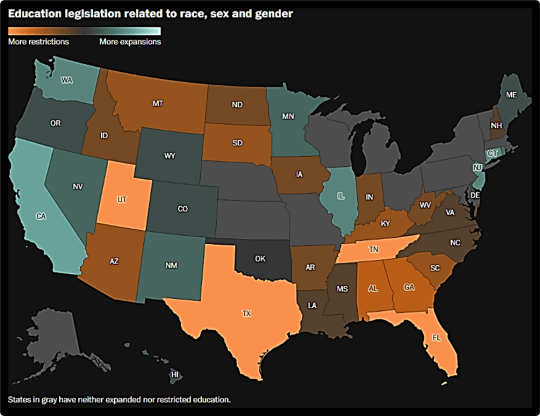

This is an excellent article in The Washington Post about how our school systems have begun to reflect the political divisions in our nation, with many red states legally banning discussions on racism, sexism, and gender issues, and many blue states legally requiring those kinds of discussions. This is a gift🎁link, so anyone can read the entire article, even if the don't subscribe to the Post. Below are some excerpts:
Three-fourths of the nation’s school-aged students are now educated under state-level measures that either require more teaching on issues like race, racism, history, sex and gender, or which sharply limit or fully forbid such lessons, according to a sweeping Post review of thousands of state laws, gubernatorial directives and state school board policies. The restrictive laws alone affect almost half of all Americans aged 5 to 19.
[...]
The divide is sharply partisan. The vast majority of restrictive laws and policies, close to 9o percent, were enacted in states that voted for Donald Trump in the 2020 presidential election, The Post found. Meanwhile, almost 80 percent of expansive laws and policies were enacted in states that voted for Joe Biden in 2020.

The explosion of laws regulating school curriculums is unprecedented in U.S. history for its volume and scope, said Jonathan Zimmerman, a University of Pennsylvania professor who studies education history and policy...states have never before stepped in so aggressively to set rules for local schools.
[...]
[A] nationally representative study from the Rand Corp. released this year found that 65 percent of K-12 teachers report they are limiting instruction on “political and social issues.”
“What the laws show is that we have extremely significant differences over how we imagine America,” Zimmerman said.
[...]
In practice, these divisions mean that what a child learns about, say, the role slavery played in the nation’s founding — or the possibility of a person identifying as nonbinary — may come to depend on whether they live in a red or blue state.
[...]
Almost 40 percent of these laws work by granting parents greater control of the curriculum — stipulating that they must be able to review, object to or remove lesson material, as well as opt out of instruction.
[...]
Another almost 40 percent of the laws forbid schools from teaching a long list of often-vague concepts related to race, sex or gender.

[...] At the college level, among the measures passed in recent years is a 2021 Oklahoma law that prohibits institutions of higher education from holding “mandatory gender or sexual diversity training or counseling,” as well as any “orientation or requirement that presents any form of race or sex stereotyping.”
By contrast, a 2023 California measure says state community college faculty must employ “teaching, learning and professional practices” that reflect “anti-racist principles.”
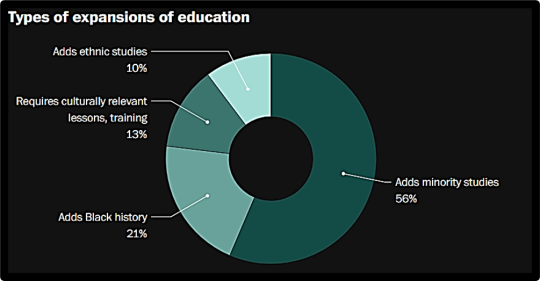
Some experts predicted the politically divergent instruction will lead to a more divided society.
“When children are being taught very different stories of what America is, that will lead to adults who have a harder time talking to each other,” said Rachel Rosenberg, a Hartwick College assistant professor of education.
#us education#political division#red states#blue states#censorship#racism#sexism#gender issues#the washington post#gift link
62 notes
·
View notes
Text
It's all "Kids Need To Be Back In School!!" until city schools are so underfunded that multiple schools have to close for multiple days because there's no air condition and it's still hot out, or in winter there's no heat (while the former governor and centrist darling uses state funds to install a heated driveway at the governor's mansion)
#baltimore#us education#larry hogan#this happened every fucking year before covid and now that kids are back in school it's happening again#it's pretty damn obvious that parents wanted kids back in school not for the kids' mental health#but to get the kids 'out of their hair'#how's that working for you now#(i should be charitable and acknowledge that lower income families couldn't afford childcare and hold down a job#but like. medical bills are expensive if i a kid catches covid or brings it home)
161 notes
·
View notes
Text
Want to hear something horrifying about education?
I recently found out that they still use the exact same edition of the exact same World History textbook that I was taught from in high school.
It was published in 2007...
The kids who are currently being taught from it HADN'T BEEN BORN YET!
Wtf...
I found this out like a month ago when I saw a kid's textbook at work and recognized it by the front cover.
I'm still not over it.
#education#us education#us education system#public school#high school#history#world history#textbooks#screaming#bush was still president of the usa when this thing was published#the “modern day” section at the back was hilariously out of date#books
51 notes
·
View notes
Text
fit speaking SO MUCH TRUTH RN about the us education system. we literally would rather pay subs and long-term subs that can’t do anything, or hire new inexperienced teachers, than keep teachers and workers who know wth they’re doing and pay them a living wage.
my mom worked in learning support. fantastic at her job. literally was paid 12$ an hour. as a lifeguard in the summer, i, a minor with no degrees or specialized academic education, would make 3$ more an hour. every teacher i’ve ever had says they aren’t paid enough. one of my teachers quit doing an extra curricular because they only paid her something like 24 extra cents an hour for it???? every student teacher ive ever had got hired straight out of the gate because the school left themselves no other options. hire young people who weren’t getting paid before to make minimum wage :DD
separate issue but i’ve also heard about subs and aides hired in our district that can’t speak english, that can’t do their jobs, that won’t learn how to do their jobs, but the school won’t fire them because they’re afraid of the repercussions of firing a poc. meanwhile the poc teachers and admin that are actually important are quitting. the vast majority of our student and teacher body are white.
but nah lets spend 800 billion dollars on military
#fitmc#tagging bc he said it#education#us education#us education system#sorry im making a lot of posts complaining and also interspersing them with silly ones#just my blog!#elle.txt
15 notes
·
View notes
Link
This is an excellent commentary by Henry Louis Gates Jr. The link above is a gift link, so anyone can read the entire column, even if they don’t subscribe to The New York Times.
Gates argues convincingly that what far right politicians like Ron DeSantis are doing in trying to control the history that is taught in schools is very similar to what was done by the United Daughters of the Confederacy in their promotion of schools teaching the “Lost Cause” and a rewritten whitewashed history.
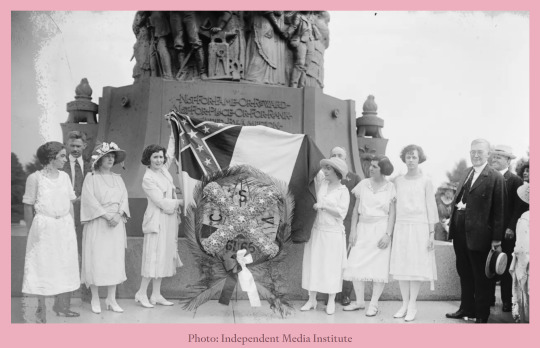
Gates also argues that there has always been rigorous debate within the Black community about many “ideological and theoretical framework[s]” regarding the Black experience in America. He believes these differences are discussed in African American Studies courses and raise important debates for the students who take those classes.
The one important thing Gates left out of this essay was that in the 1920s the KKK also promoted only teaching a history that praised the founders, much like the “patriotic” civics/history DeSantis and other GOP politicians are also pushing.
Below are some highlights from the column [all emphasis added]:
Lurking behind the concerns of Ron DeSantis, the governor of Florida, over the content of a proposed high school course in African American studies, is a long and complex series of debates about the role of slavery and race in American classrooms.
“We believe in teaching kids facts and how to think, but we don’t believe they should have an agenda imposed on them,” Governor DeSantis said. He also decried what he called “indoctrination.”
[...]
Even if we give the governor the benefit of the doubt about the motivations behind his recent statements about the content of the original version of the College Board’s A.P. curriculum in African American studies, his intervention falls squarely in line with a long tradition of bitter, politically suspect battles over the interpretation of three seminal periods in the history of American racial relations: the Civil War; the 12 years following the war, known as Reconstruction; and Reconstruction’s brutal rollback, characterized by its adherents as the former Confederacy’s “Redemption,” which saw the imposition of Jim Crow segregation, the reimposition of white supremacy and their justification through a masterfully executed propaganda effort.
Undertaken by apologists for the former Confederacy with an energy and alacrity that was astonishing in its vehemence and reach, in an era defined by print culture, politicians and amateur historians joined forces to police the historical profession. The so-called Lost Cause movement was, in effect, a take-no-prisoners social media war. And no single group or person was more pivotal to “the dissemination of the truths of Confederate history, earnestly and fully and officially,” than the historian general of the United Daughters of the Confederacy, Mildred Lewis Rutherford, of Athens, Ga. Rutherford was a descendant of a long line of slave owners.... Rutherford served as the principal of the Lucy Cobb Institute (a school for girls in Athens) and vice president of the Stone Mountain Memorial project, the former Confederacy’s version of Mount Rushmore.
As the historian David Blight notes, “Rutherford gave new meaning to the term ‘die-hard.’” Indeed, she “considered the Confederacy ‘acquitted as blameless’ at the bar of history, and sought its vindication with a political fervor that would rival the ministry of propaganda in any twentieth-century dictatorship.” And she felt that the crimes of Reconstruction “made the Ku Klux Klan a necessity.” As I pointed out in a PBS documentary on the rise and fall of Reconstruction, Rutherford intuitively understood the direct connection between history lessons taught in the classroom and the Lost Cause racial order being imposed outside it, and she sought to cement that relationship with zeal and efficacy. She understood that what is inscribed on the blackboard translates directly to social practices unfolding on the street.
[See more under the cut.]
“Realizing that the textbooks in history and literature which the children of the South are now studying, and even the ones from which many of their parents studied before them,” she wrote in “A Measuring Rod to Test Text Books, and Reference Books in Schools, Colleges and Libraries,” “are in many respects unjust to the South and her institutions, and that a far greater injustice and danger is threatening the South today from the late histories which are being published, guilty not only of misrepresentations but of gross omissions, refusing to give the South credit for what she has accomplished, … I have prepared, as it were, a testing or measuring rod.” And Rutherford used that measuring rod to wage a systematic campaign to redefine the Civil War not as our nation’s war to end the evils of slavery, but as “the War Between the States,” since as she wrote elsewhere, “the negroes of the South were never called slaves.” And they were “well-fed, well-clothed and well-housed.”
Of the more than 25 books and pamphlets that Rutherford published, none was more important than “A Measuring Rod.” Published in 1920, her user-friendly pamphlet was meant to be the index “by which every textbook on history and literature in Southern schools should be tested by those desiring the truth.” The pamphlet was designed to make it easy for “all authorities charged with the selection of textbooks for colleges, schools and all scholastic institutions to measure all books offered for adoption by this ‘Measuring Rod,’ and adopt none which do not accord full justice to the South.” What’s more, her campaign was retroactive. As the historian Donald Yacovone tells us in his recent book, “Teaching White Supremacy,” Rutherford insisted that librarians “should scrawl ‘unjust to the South’ on the title pages” of any “unacceptable” books “already in their collections.”
On a page headed ominously by the word “Warning,” Rutherford provides a handy list of what a teacher or a librarian should “reject” or “not reject.”
“Reject a book that speaks of the Constitution other than a compact between Sovereign States.”
“Reject a textbook that does not give the principles for which the South fought in 1861, and does not clearly outline the interferences with the rights guaranteed to the South by the Constitution, and which caused secession.”
“Reject a book that calls the Confederate soldier a traitor or rebel, and the war a rebellion.”
“Reject a book that says the South fought to hold her slaves.”
“Reject a book that speaks of the slaveholder of the South as cruel and unjust to his slaves.”
And my absolute favorite, “Reject a textbook that glorified Abraham Lincoln and vilifies Jefferson Davis, unless,” she adds graciously, “a truthful cause can be found for such glorification and vilification before 1865.”
And what of slavery? “This was an education that taught the negro self-control, obedience and perseverance — yes, taught him to realize his weaknesses and how to grow stronger for the battle of life,” Rutherford writes in 1923 in “The South Must Have Her Rightful Place.” “The institution of slavery as it was in the South, far from degrading the negro, was fast elevating him above his nature and race.” For Rutherford, who lectured wearing antebellum hoop gowns, the war over the interpretation of the meaning of the recent past was all about establishing the racial order of the present: “The truth must be told, and you must read it, and be ready to answer it.” Unless this is done, “in a few years there will be no South about which to write history.”
In other words, Rutherford’s common core was the Lost Cause. And it will come as no surprise that this vigorous propaganda effort was accompanied by the construction of many of the Confederate monuments that have dotted the Southern landscape since.
While it’s safe to assume that most contemporary historians of the Civil War and Reconstruction are of similar minds about Rutherford and the Lost Cause, it’s also true that one of the most fascinating aspects of African American studies is the rich history of debate over issues like this, and especially over what it has meant — and continues to mean — to be “Black” in a nation with such a long and troubled history of human slavery at the core of its economic system for two-and-a-half centuries.
Heated debates within the Black community, beginning as early as the first decades of the 19th century, have ranged from what names “the race” should publicly call itself (William Whipper vs. James McCune Smith) and whether or not enslaved men and women should rise in arms against their masters (Henry Highland Garnet vs. Frederick Douglass). Economic development vs. political rights? (Booker T. Washington vs. W.E.B. Du Bois). Should Black people return to Africa? (Marcus Garvey vs. W.E.B. Du Bois). Should we admit publicly the pivotal role of African elites in enslaving our ancestors? (Ali Mazrui vs. Wole Soyinka).
Add to these repeated arguments over sexism, socialism and capitalism, reparations, antisemitism and homophobia. It is often surprising to students to learn that there has never been one way to “be Black” among Black Americans, nor have Black politicians, activists and scholars ever spoken with one voice or embraced one ideological or theoretical framework. Black America, that “nation in a nation,” as the Black abolitionist Martin R. Delany put it, has always been as varied and diverse as the complexions of the people who have identified, or been identified, as its members.
[...]
As a consultant to the College Board as it developed its A.P. course in African American studies, I suggested the inclusion of a “pro and con” debate unit at the end of its curriculum because of the inherent scholarly importance of many of the contemporary hot-button issues that conservative politicians have been seeking to censor, but also as a way to help students understand the relation between the information they find in their textbooks and efforts by politicians to say what should and what should not be taught in the classroom.
Why shouldn’t students be introduced to these debates? Any good class in Black studies seeks to explore the widest range of thought voiced by Black and white thinkers on race and racism over the long course of our ancestors’ fight for their rights in this country. In fact, in my experience, teaching our field through these debates is a rich and nuanced pedagogical strategy, affording our students ways to create empathy across differences of opinion, to understand “diversity within difference,” and to reflect on complex topics from more than one angle. It forces them to critique stereotypes and canards about who “we are” as a people and what it means to be “authentically Black.” I am not sure which of these ideas has landed one of my own essays on the list of pieces the state of Florida found objectionable, but there it is.
[emphasis added]
There is much more in this essay that is worth reading. As I said before, the gift link above will allow you to read the entire essay. I encourage you to do so.
[edited]
#henry louis gates jr#black history month#ron desantis#ap african american studies#united daughters of the confederacy#kkk#whitewashed history#white nationalist indoctrination#us education#gop#the new york times
57 notes
·
View notes
Text
#us education#education#Institute for Curriculum Services#ics#racism#Teach Palestine#free palestine#israel's propaganda#k 12
8 notes
·
View notes
Text
Hey!!
I work as a 1 on 1 aide with a student who is on the spectrum. I am not on the spectrum, but I do have ADHD, and so we clash a lot bc our quirks don't mesh well. I want to be able to be a good aide, but I'm not always sure how best to help.
If anyone on here has any advice on how best I can help her, I really want to hear from people on the spectrum on what would help them. She's in middle school, if that impacts any advice.
I really appreciate any help!!
43 notes
·
View notes
Text
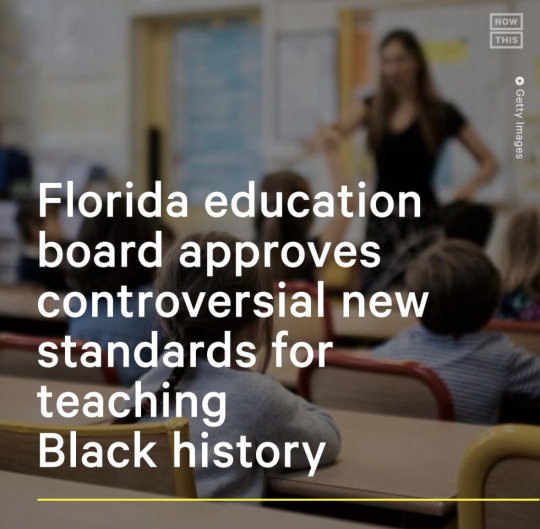
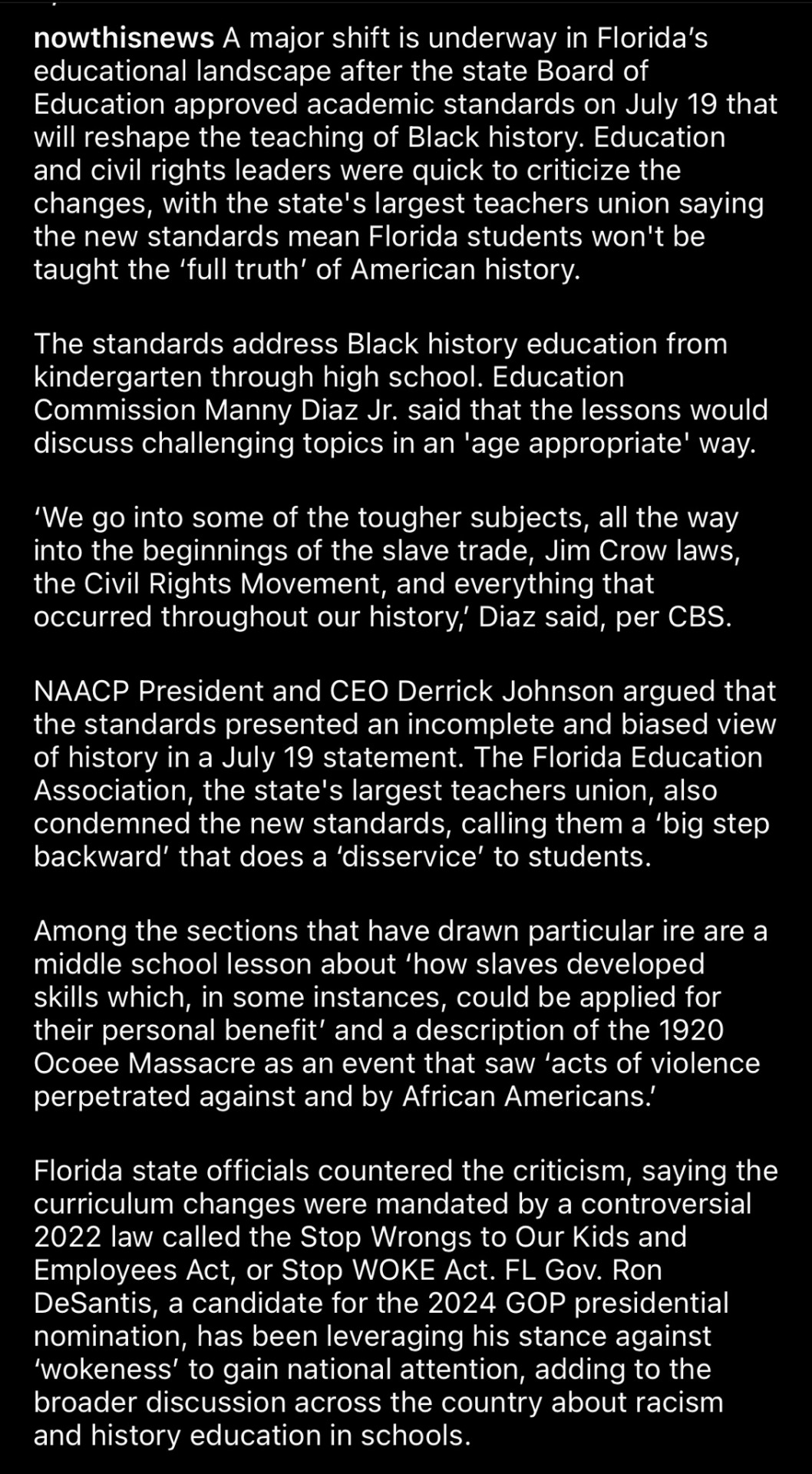
26 notes
·
View notes
Video
Homeschooling in Ohio
Contact senator Brenner
614-466-8086
[email protected]
Twitter @ BrennerForOhio
https://www.vice.com/en/article/z34ane/neo-nazi-homeschool-ohio
#tiktok#ohio#andrew brenner#home schools#home schooling#article#public education#us education#education
176 notes
·
View notes
Text

https://twitter.com/libsoftiktok/status/1696664790821666816?s=09
School board removes a man for reading from the pornographic book they allow in a public school library.
#grooming#child grooming#us schools#school boards#us education#us education system#education#education system#schools#school#us politics#politics
150 notes
·
View notes
Link
Florida teachers learn that they must embrace the political dogma of the Florida GOP or they will face unending harassment and possible firing. Adam Tritt, a high school English teacher in Palm Bay, Florida, was shocked when his school’s librarian – eager to comply with Florida’s new law restricting “inappropriate” books in schools – removed one-third of the books on his classroom shelves, including a collection of Emily Dickinson’s poetry that was not on her list of approved books.
Vivian Taylor, a seventh-grade teacher in Miami, says she was told to hardly discuss Emmett Till – the 14-year-old victim of one of the US’s most notorious lynchings – in her civics classes because under Florida’s year-old “stop woke” law, “people say you’re not supposed to talk about that because it will make children uncomfortable”.
Carol Cleaver, a middle-school science teacher in Pensacola, says that when LGBTQ+ students who are feeling hopeless or depressed approach her to discuss their emotional troubles, she, different from before, often balks at telling them about a crisis support hotline for young LGBTQ+ people. She fears that if she mentions it, she will get in trouble under the Parental Rights in Education bill (known as the “don’t say gay” law) backed by Florida’s governor, Ron DeSantis.
As the summer holidays approach, Florida teachers are feeling anxious, confused and beaten down by new laws, championed by DeSantis, that limit how issues of race can be taught, what teachers can say about sex, especially about homosexuality, and what books are permitted in schools. In promoting this legislation, DeSantis angered many teachers when he denounced “indoctrination in our schools” and let his press secretary accuse teachers of “grooming” students.
In interviews with the Guardian, Florida teachers said they’re feeling more disrespected, unappreciated and under attack than ever before, worried that they’ll be fired or otherwise punished if they run afoul of the controversial – and often vague – new laws. As a result of these laws and their emboldening parents to challenge and even castigate teachers, many Florida teachers say they’re considering either giving up teaching or finding a teaching job in another state – all when Florida, which ranks 48th among states in teacher pay according to a recent study, is already suffering from a shortage of 5,300 teachers.
Florida teachers complain that DeSantis – who is expected to announce plans to run for the Republican presidential nomination – has targeted them as part of a culture war aimed at winning over GOP voters.“
All this is just one more rock on the scale toward leaving,” said Arian Dineen, a middle school teacher in Stuart, 100 miles north of Miami. “I have many friends and colleagues who are genuinely afraid.” Afraid, for instance, of being accused of teaching critical race theory, an esoteric theory about race, rarely taught outside universities, that a DeSantis-backed law bars schools from teaching. “There are many more important things for the governor to be worrying about,” Dineen added. “We have a housing affordability crisis, a health insurance crisis, a housing insurance crisis. It’s absurd for the governor and legislature to be worried about teachers indoctrinating students on things we don’t even discuss in class.”
* * * *
One of the reasons I am glad that I no longer live in Florida. I see this attack on education by the Fla. Governor [to further his political ambitions] as a terrible calamity for the cause of Public Education. Substituting propaganda for education and demanding the equivalent of “loyalty oaths” from teachers is more than a fascist leaning. It is indeed fascism come to our country.
Martin Buber on Education and Propaganda:
"The real struggle is not between East and West, or capitalism and communism, but between education and propaganda. Education means teaching people to see the reality around them, to understand it for themselves. Propaganda is exactly the opposite. It tells the people, "You will think like this, as we want you to think!"
Education lifts the people up. It opens their hearts and develops their minds so that they can discover the truth and make it their own. Propaganda, on the other hand, closes their hearts and stunts their minds. It compels them to accept dogmas without asking themselves, "Is this true or not?"
The trouble is that this is not only a conflict of ideology. It is a conflict of tempo. The tempo of propaganda is feverish, nervous. It is the pace of television and radio. It is the pace of the newspaper headline, the cry of the vendor in the street. Whereas education goes at a slow pace. It is the pace of teachers talking with their students. It is the pace of a man reading by himself in a room. It cannot be hurried or speeded up and remain education."
#florida#ron desantis#us education#us unions#education#teachers#next generation#Martin Buber#propaganda
36 notes
·
View notes
Link
It is hard to know exactly how many U.S. classrooms are short of teachers for the 2022-2023 school year; no national database precisely tracks the issue. But state- and district-level reports have emerged across the country detailing staffing gaps that stretch from the hundreds to the thousands — and remain wide open as summer winds rapidly to a close.
[...]
Why are America’s schools so short-staffed? Experts point to a confluence of factors including pandemic-induced teacher exhaustion, low pay and some educators’ sense that politicians and parents — and sometimes their own school board members — have little respect for their profession amid an escalating educational culture war that has seen many districts and states pass policies and laws restricting what teachers can say about U.S. history, race, racism, gender and sexual orientation, as well as LGBTQ issues.
“The political situation in the United States, combined with legitimate aftereffects of covid, has created this shortage,” said Randi Weingarten, president of the American Federation of Teachers.
[...]
Other districts and states are attempting more unorthodox fixes. A new state law in Arizona, signed by Gov. Doug Ducey (R) last month, allows college students to take teaching jobs. A similar law, which took effect in Florida on July 1, offers K-12 teaching jobs to military veterans who served for at least four years. The veterans do not need bachelor’s degrees but must have earned at least 60 college credits while maintaining a grade-point average of at least 2.5.
Well, what do you expect when you underpay teachers, stifle what they can say in the classroom, and weaponize right-wing parents to berate them and scrutinize everything they do?
The GQP wants to destroy public education in this country and is just fine with having undereducated constituents. They are much easier to manipulate.
196 notes
·
View notes